I've never had a writing mentor.
The reasons for this are many, and most of them aren't sound. But that's the bald fact of it: throughout my professional writing life, I've never had a mentor.
Let me be clear: I've always had people helping me. I've had editors and publicists and colleagues and other writers. I have an agent, whatever use that is to a poet. But a mentor, in the ways that I understand this figure to exist in the literary life, has been curiously absent.
The main reason for this is, simply, that I have never trusted anyone enough to be my mentor. A mentor, that is, who offers the professional insider's details about prizes and publications, who offers collegial protection and support, who over the years provides the sustaining encouragement and occasional wine-soaked dinner necessary to develop as a writer; in other words, the kindly overseer to one's career and protein intake during the artistic lean years. A person who has a stake of his own in your developing career and who hovers between father-figure, teacher, and aide-de-camp.
It takes stamina and high self-esteem to make yourself into somebody's mentor. Not only do you have to believe you know more than the person you are mentoring, you have to believe that what you have to offer--the insights, the editorial connections, the flashy list of email addresses--essentially, your own professional status--is worth a younger writer having. For this reason alone, I don't fault the women writers I studied with for not stepping up with advice, for attending our readings or offering to hook any of the young female writers in their class up with contacts. At the time, I wouldn't have dreamed that this was a task they should undertake. I, along with almost everyone else in class, was happy just to sit with them for three hours each week, learning how to write.
And it wasn't as if offers of mentorship weren't being made. Offers were being made, and on a somewhat regular basis since I began writing seriously in college. These offers were always from older male writers and, yes, several of these offers carried with them the faint whiff of sexual attraction, sometimes even predation. There was, for instance, the writer in Ireland who was drying out but liked to have me down shots of whisky during his office hours, who said he liked my poems and offered to take me to literary parties around Dublin to meet "important" people. There was the famous male poet at a conference who took me aside to praise my work and then spent the rest of an hour telling me about the beautiful whores he met in Asia. There was the novelist who directed my graduate program who, when I asked for advice on how to choose between the two agents interested in representing me (one of only three times in my entire life I have ever asked anyone explicitly for mentoring help), looked me up and down, smiled and asked: "Do you photograph as good as you look?"
And then there was the poet I studied with as an undergraduate, a wildly talented man who was also a brilliant teacher of prosody. He gave me the first piece of praise that I actually wanted to believe--and that I respected--when I read it. At the back of a sheaf of my poems, he'd written a long letter discussing my various successes and failings with meter, and then ended it with this: "You have a ways to go. But you are much farther along than I could have dreamed of being at your age."
The hope this sentence offered, coupled with the clear-eyed assessments of my current abilities, seemed like writing well could be--would be--a realizable ambition for me. The letter made me almost light-headed with relief. It was better than praise. He was allowing that not only might I attain what he had, he was subtly encouraging me to try to best him at it.
It was one of the most generous things anyone could have offered me.
And then, a few months later, when I'd moved to Ireland, I received a letter from him. I don't know how he got the address, whether I'd given it to him or my parents had forwarded it on, but one day a couple of hand-written pages came in the mail, and I didn't know what to do with them. The letter said nothing inappropriate. It made no insinuations, didn't attempt to provoke or sexually court me in any way, but still I felt it was odd. I didn't know what answering it would mean, what a friendship between two professional unequals would entail. I was 20 years old; he was somewhere in his 40's. I didn't feel harassed, but I also didn't feel powerful enough yet to answer him. And so I never sent back a reply. My silence was meant to make clear to myself if not to him what my position would be in the world among writers: I wanted people to help my work, not me. Frankly, I didn't even want there to be a me.
Over the years, I have continued to receive a smattering of letters and offers of professional attention that hover between the intellectually interested and baldly flirtatious. More established, sometimes famous, male writers asking to see poems or books. Asking me to send them work. And, true to my then-20 year-old's sense of decorum, I have never responded to any of them. About this decision, I have been both right and wrong. Were some of these men more willing to help me because they thought I was pretty? Yes. Did I ever feel unsafe with them or worry that I was at their professional mercy? No. Was it unfortunate that my experience of mentorship to date had relied occasionally upon my appearance as well as on my writing talent? Absolutely. Should I have thus rejected outright all these offers of help? No.
Because to dismiss outright all offers of professional help based on the desire to be seen as competing and existing in a meritocracy, to insist that I be treated solely as a collection of a poems, to be essentially un-selfed, is unrealistic. In the end, you seek a mentor to help ensure your work finds an audience, the widest one it can. Let me be clear: I am not suggesting that I should have sexually compromised myself. But the fact is, my looks were my looks. They were there, and one day they would not be.
I couldn't hold off taking advice from those who offered help in order to make me feel perfectly comfortable. You engage in a mentoring relationship for professional, not only personal, reasons. In retrospect, I think I was too fastidious--or just naive--about certain emotional entanglements of mentorship. The envy I have felt--still feel--for people with mentors who have helped get them jobs and awards and certain high-profile publications is, I realize, an envy entirely of my own making. I, too, could likely have benefitted more directly in these ways and not had to scrap for every little thing in my career. But this is what I have denied myself. In my search for the perfect mentor, I overlooked a number of people who certainly would have been good enough. I didn't want to understand that mentorship at its heart may be practical, but it is also messy. It is, if both writers are meant to benefit from it, an unfolding work.
Also, the fact is, the question of my "appearance" had already been a significant factor in my professional life. I am not simply talking about the problems (and benefits) of female attractiveness, but about the fact of my being mixed race and passing (or not passing) for whatever race the audience of the moment wants me to be. To say that I didn't want an older male writer to mentor me because I was afraid of being objectified misses the point. I was always already being objectified. And I had also been doing a little of this back. Because the reality is that I, too, was looking for a very specific physical body to mentor me: not a man, but a woman, and a woman I hadn't yet come across, on the page or in the classroom, a woman I couldn't even yet imagine.
And I was ruthless in my rejection of potential mentors. In graduate school for medieval studies, there were only two female professors teaching in the Institute, one of them a young, ambitious and as-yet untenured scholar of Avicenna, the other a 55 year-old Art Historian who had been relegated to also being the Institute's "secretary." Unfairly, I despised this woman. I nicknamed her "Trembles" for the way she cowered in class, stammering and unsure, overpraising the male students while casting a nervous eye at her female ones. "Trembles" was the product of years of professional bullying, I now realize, which was why--at 55 years of age and with 25 years of teaching in the same institution--she remained untenured and permanently saddled with secretaryship, but back then I didn't care about the generational struggles she represented and had weathered; I wanted someone I could look up to without reservation. Someone I could be or admire.
Had I been paying attention, perhaps I might have spent a bit more time focussing on that Avicenna scholar, but by then my attention had shifted to the literary world where, still seething from my institutional time with poor "Trembles" who I wrote off as a feminist betrayal, I went on to dismiss a long parade of teachers for various personal failings. This one was too lazy, that one too grasping, this one competed with her students, that one got high before class. This was true, but with why did this necessarily make them useless as fonts of information about writing? Why didn't I press them for names of other writers to read, journals to submit to? Why hadn't I asked them some of the many questions I'd privately collected about strategizing how to assemble a collection of poems into a book? How, even, to publish said poems as a book? Why was I so interested in perfection, when what I really needed was someone simply "good enough"?
Added to these mentoring "sins" was one I knew was worse, and certainly more personally painful, than all the others. Were I to list all the casually or implicitly racist remarks about other writers (and even myself) that I'd either overheard in the hallways or outside the classroom or during the wine-soaked dinners at writing conferences over the years, this post would go on for pages. The worst part of the racism of the liberal artist or academic, however, is that it is largely hidden, unleashed just when the possible mentor figure has earned your trust, when you are likeliest to accept him or her as your professional advisor. This, too, is one of the reasons I think that, over the years, I've resisted mentorship. In the end, it's too disheartening to hear the writer you admire privately suggest that so-and-so got his job or prize due to affirmative action or white liberal guilt. It is physically painful to then consider whether your silence afterwards is the basest form of cowardice or the more practical attempt to keep the fact of your own biracial identity a secret in order to protect yourself, to ensure that this decorated writer or colleague will not--if he or she has not already done so--say the exact same thing about you.
As I write this, I see that I have two competing arguments in my thoughts about mentors. One is that the personal traits and failings--the person--of the mentor doesn't matter so much as the information this mentor has to offer. The other is that the mentor as person is all that matters. I have a harder time defending the second argument considering my conflicted feelings about the relationship between identity and art, and yet in all honesty this is the argument that most emotionally engages me. I am aware of the criticisms, fair and unfair, of identity-based writing. I have absorbed, consciously and through the slow osmosis of cultural self-hatred, the blunt "truisms" about what constitutes Poetry. The assurances drilled into me as a young writer--implicitly and explicitly--that issues of race and gender and sexuality and politics must never enter into poems, or enter either primarily as self-conscious parody of these subjects or as examinations of form which might rescue their inherently reductivist sentimentality, are ones that most people reading this are probably familiar with. And these assurances were not only drilled into me in the uber-pale midwest college town where I went to graduate school, but even by my Chinese American mother, who has spent her life teaching and promoting multiculturalism in the Seattle school district, and who told me after my first book on biracial identity was published that one day I too might write something "universal." As I've matured in my writing career, I see that one of the most important questions I have wanted to ask and have answered, the one part of my writing life I have never quite grasped myself, was how to balance this continued expectation that writing should primarily constitute an act of formal experiment and innovation, one that both utilizes and transcends personal experience, all the while consciously ignoring 3/4 of what has defined my human experience in the world.
And who, really, can answer that?
When I think of that word "mentor," all these problems and conundrums bubble up. And yet another memory, too, swims up to me: one of a night three years ago in Denver, giving an off-site reading at the Associated Writing Programs conference in support of Kundiman/Cave Canem and finding David Mura sitting right in front of me in the audience.
David Mura is a writer I have had a lot of arguments with. Not in person, as that night was the first time we had ever officially "met," but in the classrooms where I've taught him, and in my thoughts after finishing one of his books. He's infuriated, inspired, and intrigued me. His work has forced me to re-examine the terms in which race and ethnicity and gender do--or don't--get written into a poem. A Japanese-American Nissei male, David Mura is someone who, in many ways, I don't have a lot in common with but whose presence, as I watched him watching me from his little table in the front row of that packed reading, I realized had been undeniably powerful to me.
Powerful in the ways that the presences of Maxine Hong Kingston or Frank Chin or Lois Ann Yamanaka or Myung Mi Kim or Theresa Hak Kyung Cha or Li Young Lee or Carlos Bulosan would have been had they also been in that room, impossible as that thought is. Though I have attended plenty of AWPs, have met and listened to dozens of writers I admire, that night in Denver was the first time I had ever felt electrified by the presence of another writer. I was now standing and reading my work in front of someone who I knew had made his own similar forays into the literary world, running up against problems that--if they were never the same as mine--certainly tread a very familiar path. However much I disagreed with or admired or fought against his work, David Mura had cracked open the subject matters and genres in which I myself was now working; he had made a connection into the literary world that made it possible for me to make my own. I was, quite literally, on the verge of tears leaving the bar after that reading. I realized that over the years, I had been denying myself not only the information that would have made my writing career easier to manage, but the ability to express gratitude to those whose work was written, if even in part, for those like me.
And that is what I now understand the acceptance of mentoring to be on the part of the mentored writer: a sign of gratitude. In its way, a debt of honor. I understood, suddenly, the true meaning of what I had denied myself and others, and since then have had to take comfort in the knowledge that, even if I'd never admitted this debt of mentorship consciously to myself, I had at least taken advantage of a deep engagement with Mura's, and other's, work over the course of my life. In that sense, I had long been mentored by writers who were also, conveniently, absent enough to let me experiment with my own language: to help me write as me. To bring me, in that sense, into being.
Perhaps this is the kind of epiphany only a writing conference whose social hub is a bar can inspire. And yet, it was there. I stumbled out of the Denver nightclub, blinking and breathless. A piece of David Mura, a scrap of Heather McHugh, snippets clipped from the Irish poet, a perfectly metered line from the prosodist, and more and more and others trailed after me. My own little poetic Frankenstein. Aesthetically incoherent, maybe, disordered in appearance, and professionally not useful, but something.
A something, for better or worse, which has become my more than good enough.

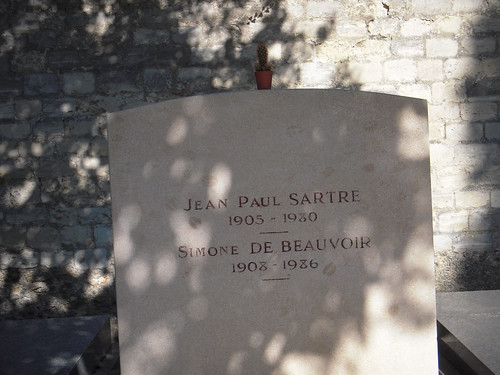
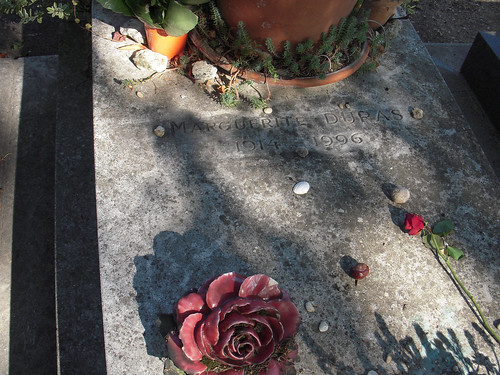
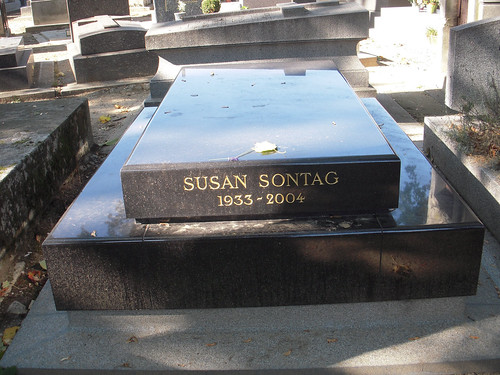
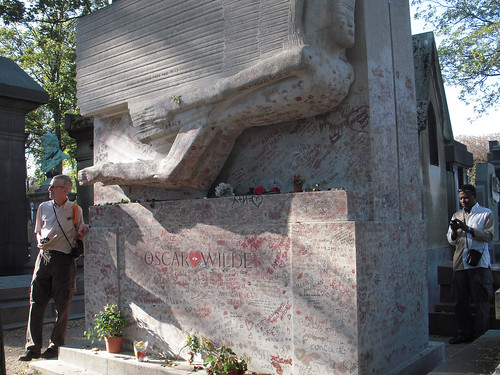
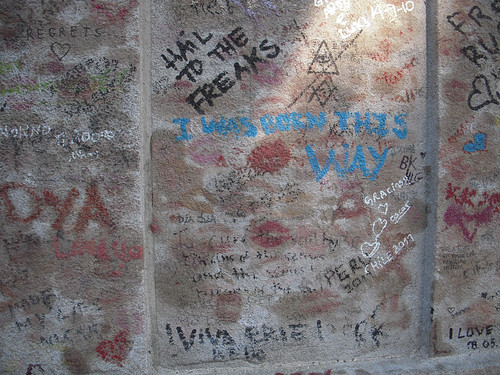
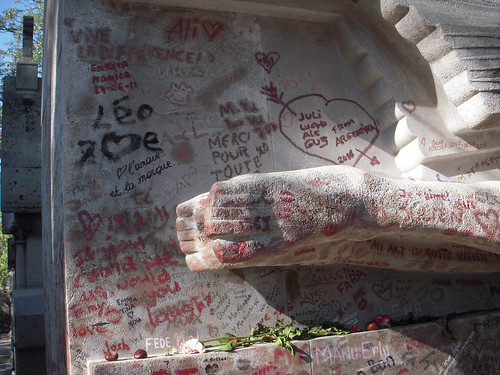
Another great, insightful post, Paisley. The revelation of gratitude is a wonderful thing.
ReplyDeleteGeez, I hope this is the essay you're submitting.
ReplyDeleteAh! The grave sites. I love the pictures. Thank you.
ReplyDeleteAnd I so agree about the difficulty, the longing for and yet revulsion to and yet general conflict over, in the question of the mentor. Do we all eventually put together such a frankenstein? I feel I have. Maybe it's just those of us who are, as my friend Mickey says, decidedly not guru people. (She distinguishes between people who can follow a charismatic leader/religion/idea and people who can't turn off the part of their brain that's noticing said leader/religion/idea has mustard on his/its shirt.) Even while feeling what you so rightly name gratitude.
Now, I have the sneaking suspicion I'm on the other side of this as well. Even though I still feel so clueless so often. I dearly hope the people who come to me seeking mentorship are not expecting me to be everything to them. I am surprised by it EVERY SINGLE TIME. I hope they are asking lots of people, crafting their own monster out of the bits and pieces. Because I can't possibly provide all they need.
On a different point--what makes a writer the type that people carve messages into their headstone? and what makes them not? Wilde and Sontag, I get. I would have thought Simone would have a few devotees. Is that gendered too?
Hey Elizabeth:
ReplyDeleteI have no idea why there wasn't more stuff for Simone on her grave. What was there was also fairly embarrassing: subway tickets, melting chocolate cookies, a cigarette and 20 centimes. Like a homeless person just shook out his pants pocket. What I thought was truly odd was the little phallic cactus on the top of the grave: a kind of "fuck you" to poor Simone?
I, too, worry about what being a mentor now entails as I stand (supposedly) on the other side of that gap. I'm not sure what people want or need from me outside of the endless endless letters of rec, which I'm fine writing. One friend just totaled his letters up to be 430 pages. I have no idea what mine are, but certainly one of my greatest tomes will be letters of recommendation. And I'm fine with that. But what mentoring entails over the course of many years--even a life--I'm still trying to figure out myself.
Dear Paisley,
ReplyDeleteThanks for writing this! It does seem that the instinct to be self-protective - might hurt young women, I definitely felt this same feeling when I started out. So maybe as women writers we have to reach out to our younger peers now that we are, um, getting to be the generation that might be mentors rather than getting mentored?
Interesting stuff! Thanks for posting!
Hi Paisley,
ReplyDeleteJeannine's link on her blog sent me here. Interesting subject and so many layers. I don't think we can be everything to someone looking for a mentor, nor do I think anyone should be everything to us. I tend to believe in dead mentors, mentors who inspire through their craft and words. There have been a few late evenings where I've been struggling with a poem where I've said, " What would William Carlos William do?" (aka WWWCWD?)
As for the male/female thang and protectiveness, helpful vs. hidden agenda (etc), I do think I come with a "homey don't play that game" energy, and I don't think it hurts a woman to have it.
I appreciate your honesty in this post and am glad to have found your blog.
All best,
Kelli
Dear Jeanine:
ReplyDeleteI agree that it's now our turn to mentor, in whatever way we can, the new generation of women. An organization I philosophically support-even if I really actually have no idea what they DO--is VIDA, which I'm sure you know about. It would be nice if, added to their count they do each year, they provided a national networking database for women writers, something that would link women mentors and "mentees" up together. Having a wide variety of options is always a good thing. And Kelli, I agree: having an attitude is a good thing sometimes, especially as it helps protect young women. I wish I'd had a touch more of it myself.
Best,
P
Hey Paisley, So I've got your cool book Six Girls without Pants, and I bought it completely because of the killer comment by Alice Fulton on the back. Then I bought A Crash of Rhinos off amazon and it has a great comment by Thylias Moss. I wish I had mentors who would help me like that! Maybe Heather, Thylias, and Alice wrote job letters for you too? You certainly don't sound grateful here. These three are awesome poets and the best you can say is they're "notable." A little grudging, isn't it? -- Shawn
ReplyDeleteI should probably have expressed more concrete thanks for them, for sure. They did write me blurbs, which was of course extremely helpful. I'll have to check to see if any of them wrote me letters (I know it sounds insane not to know this, but it's been a really really long time, and I do have to check). I am of course very grateful for their teaching presences, and their presences on my book jackets. What I'm talking about is a slightly different type of relationship, however, than the role of being a professor/teacher. I write lots and lots of letters of recommendation, and lots of blurbs, but I wouldn't say that all of these folks are my mentees. This is the job of being a teacher: helping your students out. A mentoring relationship is, I think, a bit more active and takes place more consistently throughout a life. But I do appreciate what these teachers did for me, for what I learned from them, and of course I chose the programs I did in part because these writers are amazing. Hopefully that isn't too grudging a word.
ReplyDelete